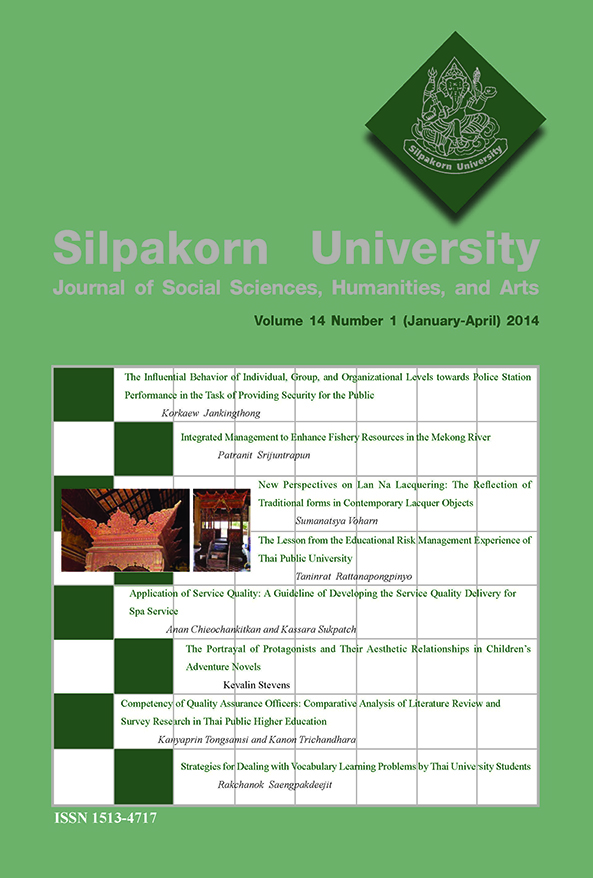Strategies for Dealing with Vocabulary Learning Problems by Thai University Students
Main Article Content
Abstract
Nowadays, vocabulary learning plays an important role in language teaching especially in the context where English is taught as a foreign language. This is because lexical competence is now seen as the heart of language competence and the ultimate goal of language teaching is to improve the language competence of learners. Additionally, vocabulary has been recognized as an important factor to language learning because insufficient vocabulary knowledge leads the learners encountering difficulties in language learning. Learners can significantly improve their language competence by developing their ability to use vocabulary learning strategies (VLSs). The present study primarily aimed at investigating how Thai university students deal with vocabulary problems. The participants were 63 undergraduate students studying at Khon Kaen University (2 campuses). A semi-structured interview was used as a method of data collection. After completing the stage of data collection, the interview recordings were transcribed verbatim and then translated from Thai into English for the purpose of data analysis. The translated data was then analyzed. The results show two main purposes in employing strategies for dealing with vocabulary learning problems: 1) to discover the meaning of unknown words; and 2) to retain the newly learned words in long-term memory and recall them at will.
Downloads
Article Details
All rights reserved. Apart from citations for the purposes of research, private study, or criticism and review,no part of this publication may be reproduced, stored or transmitted in any other form without prior written permission by the publisher.
References
Asgari, A. and Mustapha, A. B. (2011) The Type of Vocabulary Learning Strategies Used by ESL Students in University Putra Malaysia. English Language Teaching 4(2): 84-90.
Carter, R. (1987) Vocabulary and Second/Foreign Language Teaching. Language Teaching 20(1): 3-16.
Catalán, R. M. J. (2003) Sex Differences in L2 Vocabulary Learning Strategies. International Journal of Applied Linguistics 13(1): 54-77.
Dóczi, B. (2011) Comparing the Vocabulary Learning Strategies of High School and University Students: A Pilot Study. WoPaLP 5: 138-158.
Foley, J. A. (2005) English in Thailand. RELC Journal 36(2): 223-234.
Gu, P. Y. (1994) Vocabulary Learning Strategies of Good and Poor Chinese EFL Learners. Paper presented at the Annual Meeting of the Teachers of English to Speakers of Other Languages (p.27). Baltimore, March.
Haggan, M. (1990) Hitting the Headlines. English Teaching Forum 28: 41-42.
Intaraprasert, C. (2000) Language Learning Strategies employed by Engineering Students Learning English at the Tertiary Level in Thailand. Unpublished Ph.D Thesis, The University of Leeds, Leeds, England.
Intaraprasert, C. (2006) Beliefs about Learning English by Thai and Vietnamese EST Students: A Cross-Cultural Perspective. Paper presented at The 2006 TEFL International Conference “Spreading Our Wings: Meeting TEFL Challenges”. Fukuoka, Japan, August.
Laufer, B. and Goldstein, Z. (2004) Testing Vocabulary Knowledge: Size, Strength, and Computer Adaptiveness. Language Learning 54: 399-436.
Lawson, M. J. and Hogben, D. (1996) The Vocabulary-Learning Strategies of Foreign-Language Students. Language Learning 46(1): 101-135.
Ling, L. Y. (2005) Teaching Vocabulary Learning Strategies: Awareness, Beliefs, and Practices. A Survey of Taiwanese EFL Senior High School Teachers. Unpublished MA Thesis, The University of Essex, Essex, England.
Milton, J. (2009) Measuring Second Language Vocabulary Acquisition. Clevedon: Multilingual Matters.
Nation, I. S. P. (2001) Learning Vocabulary in Another Language. Cambridge: Cambridge University Press.
Nunan, D. (1991) Language teaching methodology: A textbook for teachers. New York: Phoenix ELT.
Nyikos, M. and Fan, M. (2007) A Review of Vocabulary Learning Strategies: Focus on Language Proficiency and Learner Voice. In Mizumoto, A., and Takeuchi, O. (2009). Examining the Effectiveness of Explicit Instruction of Vocabulary Learning Strategies with Japanese EFL University Students. Language Teaching Research 13(4): 425-449.
O’Malley, J. M. and Chamot, A. U. (1990) Language strategies in second language acquisition.Cambridge: Cambridge University Press.
Oxford, R. (1990) Language learning strategies: What every teacher should know. New York: Newbury House.
Oxford, R. and Crookall, D. (1990) Vocabulary Learning: A Critical Analysis of Techniques. TESL Canada Journal 7(2): 9-30.
Pigada, M. and Schmitt, N. (2006) Vocabulary Acquisition from Extensive Reading: A Case Study. Reading in a Foreign Language 18(1): 1-28.
Punch, K. F. (2005) Introduction to Social Research, 2nd ed., London: SAGE Publications Ltd.
Richards, J. C. (1976) The Role of Vocabulary Teaching. TESOL Quarterly 10(1): 77-89.
Rubin, J. (1987) Learner Strategies: Theoretical Assumptions, Research History and Typology. In Learner Strategies in Language Learning, edited by A. Wenden and J. Rubin, pp. 29-42. New York: Prentice Hall.
Rubin, J. and Thompson, I. (1994) How to be a More Successful Language Learner, 2nd ed., Boston: Heinle.
Schmitt, N. (1997) Vocabulary Learning Strategies. In Vocabulary: Description, Acquisition and Pedagogy edited by N. Schmitt and P. McCarthy, pp. 199-228. Cambridge: Cambridge University Press.
Shahov, V. P. (2012) Measuring L2 Receptive and Productive Vocabulary Knowledge. University of Reading: Language Studies Working Papers 4: 37-45.
Siriwan, M. (2007) English Vocabulary Learning Strategies Employed by Rajabhat University Students. Unpublished Ph.D Thesis, Suranaree University of Technology, Nakhon Ratchasima, Thailand.
Somsai, S. and Intaraprasert, C. (2011) Strategies for Coping with Face-to-Face Oral Communication Problems Employed by Thai University Students Majoring in English. GEMA Online™ Journal of Language Studies 11(3): 83-96.
Stern, H. (1992) Issues and Options in Language Teaching. Oxford: OUP.
Strauss, A. and Corbin, J. (1998) Basic of Quantitative Research: Techniques and Procedures for Developing Ground Theory, 2nd ed., Thousand Oaks, California: SAGE Publishers.
Takač, V. P. (2008) Vocabulary Learning Strategies and Second Language Acquisition. Clevedon: Multilingual Matters.
Wu, W. (2005) Use and Helpfulness Rankings of Vocabulary Learning Strategies Employed by EFL Learners in Taiwan. Journal of Humanities and Social Sciences 1(2): 7-13.
Yali, G. (2010) L2 Vocabulary Acquisition Through Reading—Incidental Learning and Intentional Learning. Chinese Journal of Applied Linguistic 33(1): 74-93.
Yamamoto, Y. (2011). Bridging the Gap between Receptive and Productive Vocabulary Size through Extensive Reading. The Reading Matrix 11(3): 226-242.


